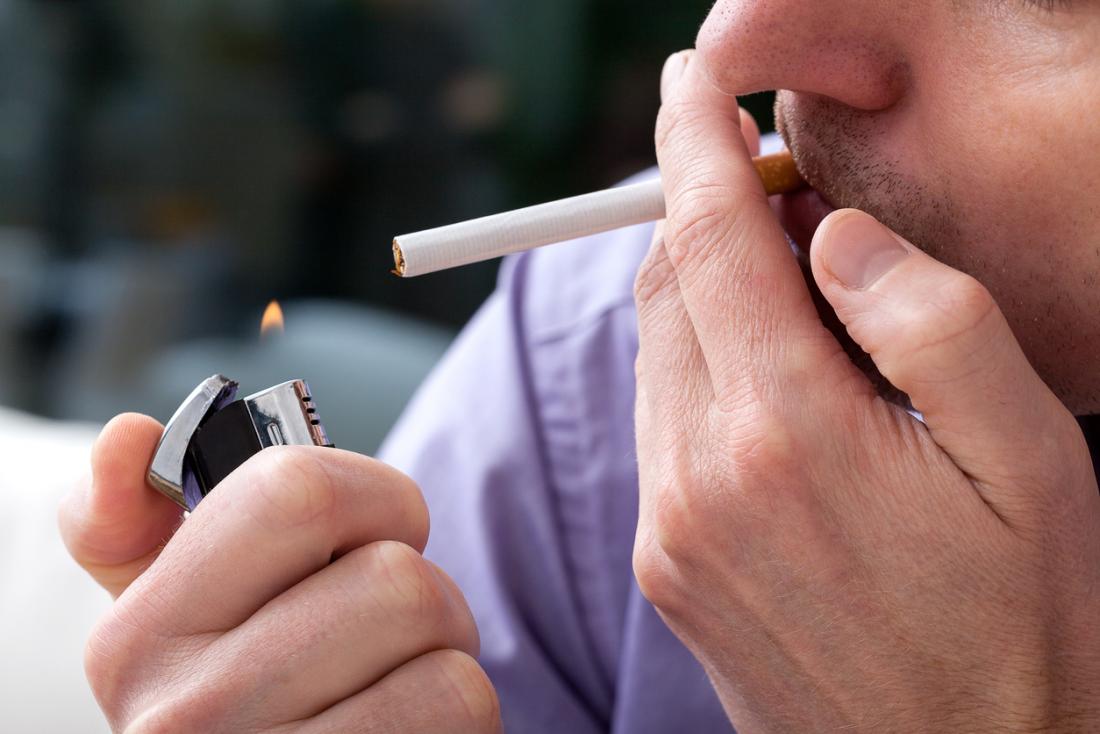Mostly, yellow tongue clears up with basic home care. But on rare occasions, the condition is a symptom of a more serious health condition that requires medical attention, usually jaundice.
The signs of yellow tongue vary depending on the cause. In the majority of cases, basic at home care, especially good oral hygiene, resolves cases of yellow tongue within a matter of days to weeks.
- A wide variety of factors can cause or contribute to the development of yellow tongue.
- Some medications and medical conditions can cause dehydration and dry mouth.
- Though rare, in some cases yellow tongue is a sign of jaundice.
What causes it?
A few specific habits, conditions, and medications are known to increase a person’s likelihood of developing the condition. Causes of yellow tongue include:
Oral hygiene products with oxidizing agents

There may be many different causes of yellow tongue.
Some oral hygiene products, such as mouthwashes, rinses, and toothpaste, contain chemicals or particles that cause dry mouth, irritate skin cells on the tongue, or cause them to change color.
Common compounds that are known to cause yellow tongue discoloration include:
- peroxides
- witch hazel
- menthol
- alcohol
- thymol
- eucalyptus
Poor oral hygiene
Teeth and tongue cleaning help reduce bacteria on the surface of the tongue, reducing the risk of developing yellow tongue.
Tobacco use
Tobacco products contain compounds and toxins that can discolor skin cells or irritate them. Tobacco can also cause cells to enlarge, increasing the chances of them trapping particles and bacteria.
Mouth breathing or dry mouth
Saliva naturally helps clear excess bacteria and particles from the tongue’s surface. Dehydration reduces saliva production, so bacteria and food particles remain near cells, increasing the risk of bacterial overgrowth. Mouth breathing, especially at night, increases the risk of dry mouth.
Black hairy tongue
Black hairy tongue is a fairly common, non-cancerous condition where bacteria or fungi cause an enlarged, elongated, hair-like carpet to appear on the surface of the tongue. Although the tongue most commonly appears black, it may also turn yellow, blue, or green.
Most people only seek treatment for the condition due to its appearance, though others experience nausea, gagging, bad breath, and a burning sensation in the mouth.
Foods with dyes, colorants, or those that stick to the tongue
Many foods contain dyes or colorants that can stain the tongue yellow, or are sticky and remain stuck to the tongue, discoloring its surface.
Certain medications and drugs
Several medications and drugs also contain staining particles, cause pigment discoloration, or weaken the immune system.
Common substances and medications that may increase the likelihood of developing yellow tongue include:
- diabetes and many diabetes management medications
- blood-thinning medications
- antibiotics
- lansoprazole (Prevacid)
- chlorhexidine (found in some disinfectant mouth rinses)
- iron salts
- minocycline
- bismuth subsalicylate
- cancer and radiation medications
- antipsychotic medications
Some Illicit drugs, such as cocaine, can also cause the tongue to discolor.
Oral thrush
Overgrowth of the bacteria Candida can cause white patches on the tongue that eventually develop a yellow tone.
Geographic tongue
Geographic tongue is a non-cancerous condition that causes red or white patches on the top and sides of the tongue that are often surrounded by a yellow border. The condition has no known cause but primarily affects children between the ages of 4 to 5. Patches tend to occur where skin cells are missing and occasionally are painful.
Jaundice
In people with jaundice, bilirubin, a chemical created by the breakdown of red blood cells, builds up abnormally in tissues. Sometimes, only specific parts of the body become yellowed, such as the whites of the eyes.
Other times, the entire skin may take on a yellow glow or hue. Unlike many of the causes of yellow tongue, jaundice requires immediate medical attention and often treatment as it is might be a sign of life-threatening conditions, such as liver failure.
Eczema and autoimmune conditions
Some autoimmune conditions such as eczema weaken the body’s immune system, allowing otherwise harmless bacteria to overgrow on the tongue. In a 2017 study, out of 35 individuals with yellow tongue coating, 32 had acute or severe eczema.
In the same study, out of 122 patients with white tongue coating, only three had acute eczema.
Gastric conditions and infections
Conditions that cause inflammation of the gastric lining have been known to cause yellow tongue coating. Several studies have confirmed that a yellow, thickened tongue coating is associated with chronic cases of gastritis or inflammation of the stomach lining, especially when caused by the bacteria Helicobacter pylori.
Who is at risk of yellow tongue?

Yellow tongue risk factors may include poor oral hygiene, dehydration, and tobacco use.
Though anyone can develop yellow tongue at any age, a few factors are known to increase the likelihood of developing the condition. Risk factors for yellow tongue include:
- poor oral hygiene
- tobacco use
- heavy consumption of coffee or black tea
- betel nut use
- alcohol use
- dehydration
- cancer
- autoimmune conditions
- neurological conditions
- disabling conditions
Symptoms
Common symptoms associated with yellow tongue include:
- bad breath
- additional white patches, film, or coating on the tongue or mucous membranes
- a bad taste
- sore throat
- burning sensation
- small, raised bumps on the tongue
- acid reflux or indigestion
- dry mouth
- fever
- the appearance of hair or fur on the tongue
- pain
Treatment and prevention options

Common ways to prevent and treat yellow tongue include brushing the tongue, increasing fiber intake, and increasing the frequency of teeth brushing.
Oral hygiene is an essential factor. The same habits and remedies that help treat yellow tongue also help prevent it. Common ways to treat and prevent yellow tongue include:
- increasing frequency and thoroughness of teeth brushing
- brushing the teeth or rinsing using an antibacterial mouth rinse after meals
- brushing the tongue gently with a soft-bristled toothbrush
- using a fluoride rinse
- scraping the tongue gently every day
- rinsing out the mouth once daily for 60 seconds with a mixture of 1 part hydrogen peroxide to 5 parts water, rinsing the mouth with water several times after
- applying baking soda directly to the tongue for 60 seconds before rinsing off
- quitting smoking or using tobacco products
- treating sinus infections
- seeking treatment for jaw conditions
- changing sleeping positions, pillows, or mattress
- using a humidifier to reduce the chances of dry mouth
- using decongesting nose sprays
- reducing the consumption of sugary and sticky sweets
- increasing fiber intake
- limiting the intake of starch or simple carbohydrate-rich foods
- avoiding sugary drinks, alcohol, and caffeine
- staying hydrated
- using alcohol and oxidant-free mouth rinses and washes
- eating a healthful diet with enough fiber
- avoiding colored or dyed drinks
- avoiding hot or acidic drinks and foods
- treating infections as soon as possible
- avoiding the use of recreational or illicit drugs
- never using unsanitary needles or tools that are exposed to blood
- consuming oral probiotics, fermented products, or yogurt
For cases where yellow tongue causes pain, burning, or discomfort, a doctor may prescribe medication or prescription grade mouth rinses or washes.
Doctors only prescribe medications for severe symptoms, or when the condition has a specific cause, such as geographic tongue disease.
Medications that may be used to treat yellow tongue include:
- topical steroids or rinses
- salicylic acid mouth rinses
- retinoid (vitamin A) medications
- antihistamines
- topical antifungal medications for thrush
- topical anesthetic medications
- topical creams with 30 percent urea
- antibiotics or antivirals to treat underlying infections
- pain medications
When should people see a doctor?
In some instances, especially when accompanied by noticeable symptoms, yellow tongue can be a sign of more serious health complications, such as jaundice.
Reasons to seek medical attention for yellow tongue include:
- symptoms of jaundice, including yellowing of the skin and whites of the eyes, bruising, fever, vomiting, nausea, fever, bloody diarrhea, and abdominal pain
- concern over the appearance of tongue color change or other tongue changes
- the color not going away with basic lifestyle adjustments, home remedies, or lasts longer than 2 weeks
- pain
- symptoms that get noticeably worse for no apparent reason
- very thick, pronounced skin cells on the tongue (papillae) that look like a layer of fur
Are there any complications?
The only complications associated with yellow tongue are those linked to more serious underlying conditions, such as jaundice.
Potential complications of jaundice include:
- liver scarring, failure, and cancer
- gastrointestinal inflammation, damage, and swelling
- fluid retention and swelling in the lower body
- spleen inflammation and enlargement
- cerebral palsy and deafness are severe complications in newborns
Let’s block ads! (Why?)





